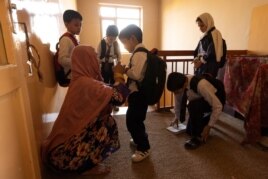21 October 2021
A large orphanage in Kabul is limiting meals for the children it cares for because it is running out of money.
Ahmad Khalil Mayan is head of Shamsa Children's Village. It is in the northern part of Afghanistan's capital.
Afghanistan has lost millions of dollars in aid since the Taliban took control of the country. Mayan told Reuters that he has been contacting many of his past donors for help.
"Most of them have left the country - Afghan donors, foreign donors, embassies. When I call them or email them, no one is answering me," he said.
"We are now trying to run the place with very little money and with little food," he added.
There are about 130 children at the orphanage. The youngest are three years of age. It has been open for more than 10 years. It provides shelter for children whose parents have died or do not have the money to look after them.
One of the children is nine-year-old Samira. She has been at the orphanage for almost two years since her father died and her mother did not have the money to support her or her brothers. She is already taking extra classes and wants to be a doctor when she grows up.
"I want to serve my homeland and save others from disease, and I also want other girls to study so that they become a doctor like me in the future," she said.

Golshan, a childcare worker, gets the children ready for school at the orphanage in Kabul, Afghanistan, October 12, 2021. REUTERS/Jorge Silva
There are many orphanages in Afghanistan. Tens of thousands of people have been killed in wars over the past 40 years.
The lack of money, since the Taliban retook control of the country, is forcing Mayan to make difficult choices. The orphanage tried to send a few children back to relatives who had the money to take care of them. But all the children have returned.
Mayan said he has had to reduce the amount of food and the kinds of food the children eat.
"Before we were providing them twice a week fruit and twice a week meat, but we cut those items to just once a week or maybe not even (that much)."
Facing an economic crisis, Taliban officials have urged Western governments to continue sending aid. It has also asked the United States to lift a block on more than $9 billion of Afghan central bank money held in foreign countries. Many countries, including the U.S., do not recognize the Taliban government.
Some governments are demanding that the group guarantee basic freedoms, including permitting girls to attend school and women to work. The Taliban banned all girls' education when they ruled from 1996 to 2001. But they have said they are now considering the issue.
A weekly limit of $200 on bank withdrawals has also hurt the orphanage. That amount is not enough for the needs of the children and workers.
Mayan fears that if the situation continues, the orphanage would not be able to stay open much longer. That would be disastrous for the children, who receive mathematics, English and computer lessons there, as well as food and shelter.
Samira, the child who hopes to become a doctor, recognizes that to reach her goals, she may have to leave the country to study.
"I am not allowed to study here," she said.
I'm Dan Novak.
Gibran Naiyyar Peshimam reported this story for Reuters. Dan Novak adapted it for VOA Learning English. Mario Ritter, Jr. was the editor.
_______________________________________
Words in This Story
orphanage — n. a place where children, whose parents have died or who cannot care for them, can live and be cared for; a home for orphans
twice –adj. two times
allow — v. to permit; to let something happen